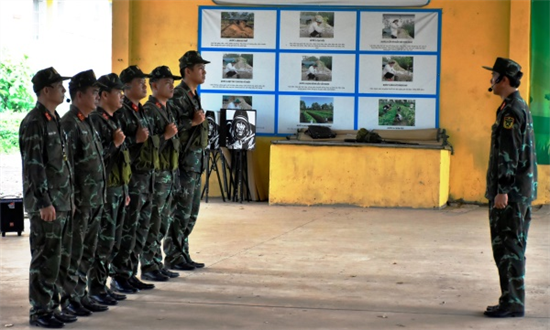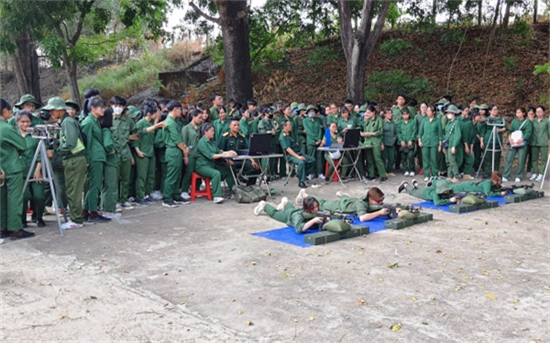The Centre for Defence and Security Education under Vietnam National University, Ho Chi Minh City (hereinafter referred to as the Centre), stands as the largest institution of defence and security education for students in the country (40,000 - 50,000 students/year). It also acts as a pioneer in transitioning to group-2 financial autonomy mechanism and in renewing defence and security education for students.
 |
| Training session for students |
Overcoming challenges to affirm its leading position
In recent years, despite facing certain challenges, including insufficient infrastructures for such a large training scale, the trend among universities towards self-managed teaching and suspension of partnerships, the policy of reducing seconded military officers, and the requirement of developing specialised lecturers, the Centre has shown great resolve for defence and security education work. Under the leadership and direction of its Party Committee and Board of Directors, the Centre has surmounted all those obstacles and affirmed its position as the “leading unit” in defence and security education for students, thus achieving commendable results. In terms of training scale and quality: for the period of 2020 - 2025, the Centre successfully organised defence and security education courses for 22 partner schools with nearly 250,000 students, ensuring absolute safety in the training process. Over 99% of the students got pass in their final exam (nearly 80% achieved merit or distinction). Regarding governance and autonomy mechanism: by being a pioneer in transitioning to a group-2 financial autonomy model and establishing a Management Council, the Centre has gained strategic flexibility and initiative in decision-making regarding training, organisation, personnel, and finance. This has consolidated its role as a national key unit in defence and security education, building its reputation based on the core values of “Solidarity - Discipline - Quality - Pioneering”. With reference to achievements and titles: the Centre was awarded Third-class Labour Order by the State President (2021); it twice received Emulation Flag from the Ministry of Education and Training (2020, 2021).
Renovating management, developing lecturers, raising the quality of teaching and science research
Firstly, renewing management and organisational structure has been identified by the Centre as an urgent requirement and a key driving force for comprehensively improving the quality and effectiveness of its training and operations. Accordingly, the Centre’s Party Committee and Board of Directors have built and gradually perfected a governance model by establishing a Management Council (January 2024). This aims to enhance advanced governance capacity and ensure efficiency and professionalism. Besides, the organisational restructuring towards an “adept, compact” model has been carried out. The Centre has made a significant breakthrough in digital transformation in governance by developing and using software systems for student management, training, administration, and military uniform. These platforms have helped automate processes, enhance transparency, and boost overall performance, marking a pioneering step towards building a Smart Centre.
 |
| Refresher course for teaching staff |
Secondly, developing a pool of lecturers, applying science and technology, adopting new models in teaching and training. Cadres and lecturers serve as the decisive factor on educational quality. Therefore, the Centre has placed special emphasis on effectively carrying out the Project on developing a contingent of lecturers, maintaining a high-quality team of seconded military officers as the core force. Currently, with 41 seconded officers, the largest number nationwide, the Centre continues to affirm its leading position in human resources among institutions of defence and security education. Additionally, it has actively promoted science and technology in teaching, transitioning theoretical exams to computer-based multiple-choice testing, organising a digital learning resource development competition, applying outcome standards for the defence and security education subject (the first centre nationwide to do so). Moreover, the adoption of the “company commander” model in place of the traditional homeroom teacher has proven effective in enhancing students’ discipline and character development through a military environment. To enable its students to meet the outcome standards for the defence and security education subject, the Centre has focused on three key pillars. (1) It has stepped up the building of ideological foundation and sense of responsibility among students. A survey of 4,799 students revealed that 36.1% found it difficult to distinguish between accurate and misleading information, reflecting their vulnerability to distorted or false content on cyberspace. Hence, the Centre has renewed its political and ideological education methods, equipping students with basic knowledge of Vietnam’s all-people national defence and people’s security policies, strengthening their “immunity” against misinformation. This approach helps students develop a firm ideological stance in identifying and fighting wrongful, hostile views. (2) Training character and discipline for students is regarded by the Centre as a critical requirement to enhance students’ self-awareness to comply with discipline and law, create unity in their will and action, and enable students to surmount difficulties in their learning process. To that end, the Centre has required faculties and student management units to combine education with maintaining regimes for learning, training, and daily life under military discipline and environment. This helps students develop resilience, self-reliance, teamwork spirit, and a disciplined, organised lifestyle - essential qualities for young generations in the new era. (3) To meet the requirements of safeguarding the Fatherland in the new context, the Centre has equipped students with necessary military knowledge and skills, enabling them to contribute to building all-people national defence and people’s security after graduation. Students have also gained skills to respond to non-traditional security threats and take part in fire fighting, rescue operations, and information security protection.
Thirdly, science research is considered a regular, essential task. Therefore, the Centre has actively performed this task through a variety of effective measures. Over the past five years, it has organised three scientific conferences at both Centre and national levels, completed five research projects, and developed four initiatives/improvements to teaching aids, all of which have been accepted and applied in practice.
 |
| Training course on shooting skills for students |
Development orientation and key solutions
In its development strategy for the period of 2021 - 2030, with a vision to 2045, the Centre identifies three breakthroughs aimed at maintaining its leading position in defence and security education: (1) accelerating the recruitment, training, and development of lecturers in tandem with implementing incentive policies to attract high-quality human resources, (2) focusing on enhancing training quality and discipline, managing and training students according to military regulations, ensuring absolute safety, (3) investing in standardised, modern infrastructures to meet the scale of 50,000 students/year and boosting digital transformation.
To effectively conduct this strategy, the Centre will focus on the following key solutions.
First, continuing to develop high-quality human resources. This is viewed as the key solution for the breakthrough in human resources, ensuring the stability and quality of the teaching staff amid a reduction in seconded military officers. This solution aims to optimise work efficiency and professional capacity to satisfy its training scale. To that end, the Centre will focus on accelerating the Project on Lecturer Development; by 2030, 70% of the specialised lecturers will gradually replace seconded military officers. A KPI-based performance evaluation system and role-based salary scheme will be introduced. The target is to ensure that over 70% of the cadres and lecturers possess postgraduate degrees, together with political steadfastness, great professional expertise, and high work performance.
Second, continuously improving training quality and science research. To ensure that 100% of students will be trained in a military environment under absolute safety and diversify extracurricular activities, the Centre will continue perfecting and running its student management software. Attention will be paid to maintaining daily and weekly military regimes, instilling disciplined conduct into students, and fostering collective spirit. The Centre will regularly perform political education and ideological orientation work for students, strengthen the dissemination of policies and laws, monitor public opinion, and opportunely handle emerging issues. Extracurricular activities will be diversified and tailored to students’ needs and aspirations, with a focus on building a clean, civilised dormitory environment conducive to study and training. Students will be encouraged to participate in meal preparation and gardening work.
The Centre will continue to review, supplement, and issue regulations on science research, focusing on both the quantity and quality of its research projects, initiatives, and improvements to teaching models/materials to achieve high practical relevance and provide direct support for teaching. Due regard will be paid to adopting outcome standards for the subject, intensifying applied science research, and effectively operating Ho Chi Minh Cultural Space. At least 15 science projects and initiatives shall be applied in practice to contribute to political and ideological education aimed at fostering a sense of responsibility towards Fatherland protection.
Third, investing in synchronised, gradually modernised infrastructure. This solution plays a decisive role in addressing current limitations in infrastructures (such as dormitories and messes) to meet the needs of 50,000 students annually and modernise teaching facilities. Based on the existing infrastructures (5 dormitory buildings, 2 messes, a 6,000 m² parade and assembly ground, 20 specialised classrooms including two modern computer testing rooms with 350 computers, 30 covered training grounds, and a 12,000 m² tactical training field), the Centre will plan to expand its dormitories and messes, procure modern teaching equipment (such as virtual shooting ranges, shooting simulators, simulated classrooms), and upgrade digital infrastructures, including Wi-Fi networks and surveillance systems.
Proud of its status as a national leader among defence and security education institutions, the Centre for Defence and Security Education under Vietnam National University, Ho Chi Minh City will keep striving to turn itself into an “exemplary, modern, smart” Centre. These efforts will contribute to fostering political willpower, discipline, self-awareness, and hands-on skills among young generations in performing defence and security tasks and firmly safeguarding the Socialist Vietnamese Fatherland in the new era.
DO DAI THANG, PhD
Director of the Centre
